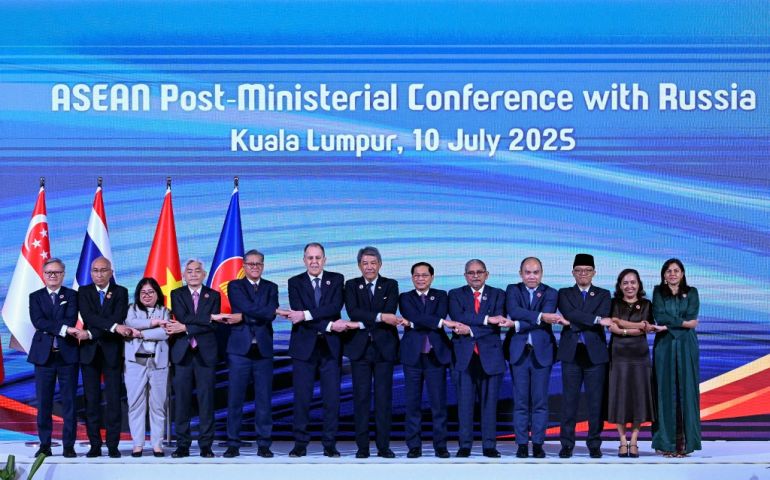China has agreed to sign a Southeast Asian treaty banning nuclear weapons, Malaysia’s and China’s foreign ministers confirmed, in a move that seeks to shield the area from rising global security tensions amid the threat of imminent United States tariffs.
The pledge from Beijing was welcomed as diplomats on Thursday gathered for the Association of Southeast Asian Nations (ASEAN) foreign ministers’ meeting, where US Secretary of State Marco Rubio is also due to meet regional counterparts and Russian counterpart Sergey Lavrov.
Malaysia’s Minister of Foreign Affairs Mohamad Hasan told reporters China had confirmed its willingness to sign the Southeast Asian Nuclear Weapon-Free Zone (SEANWFZ) treaty – an agreement in force since 1997 that restricts nuclear activity in the region to peaceful purposes such as energy generation.
“China made a commitment to ensure that they will sign the treaty without reservation,” Hasan said, adding that the formal signing will take place once all relevant documentation is completed.
ASEAN has long pushed for the world’s five recognised nuclear powers – China, the United States, Russia, France and the United Kingdom – to sign the pact and respect the region’s non-nuclear status, including within its exclusive economic zones and continental shelves.
Last week, Beijing signalled its readiness to support the treaty and lead by example among nuclear-armed states.
Rubio, who is on his first visit to Asia as secretary of state, arrived in Kuala Lumpur on Thursday amid a cloud of uncertainty caused by President Donald Trump’s aggressive tariff strategy, which includes new levies on six ASEAN nations as well as key traditional allies Japan and South Korea.
The tariffs, set to take effect on August 1, include a 25 percent duty on Malaysia, 32 percent on Indonesia, 36 percent on Cambodia and Thailand, and 40 percent on Laos and Myanmar.
Japan and South Korea have each been hit with 25 percent tariffs, while Australia – another significant Asia Pacific ally – has reacted angrily to threats of a 200 percent duty on pharmaceutical exports to the US.
Vietnam, an ASEAN nation, along with the UK, are the only two countries to have signed separate trade deals with the US, whose administration had boasted they would have 90 deals in 90 days.
The US will place a lower-than-promised 20 percent tariff on many Vietnamese exports, Trump has said, cooling tensions with its 10th-biggest trading partner days before he could raise levies on most imports. Any transshipments from third countries through Vietnam will face a 40 percent levy, Trump said, announcing the trade deal on Wednesday. Vietnam would accept US products with a zero percent tariff, he added.
Reporting from Kuala Lumpur, Al Jazeera’s Rob McBride says Southeast Asian nations are finding themselves at the centre of intensifying diplomatic competition, as global powers look to strengthen their influence in the region.
“The ASEAN countries are facing some of the highest tariffs from the Trump administration,” McBride said. “They were also among the first to receive new letters announcing yet another delay in the imposition of these tariffs, now pushed to 1 August.”
The uncertainty has pushed ASEAN states to seek alternative trade partners, most notably China. “These tariffs have provided an impetus for all of these ASEAN nations to seek out closer trade links with other parts of the world,” McBride added.
China’s Foreign Minister Wang Yi has been in Kuala Lumpur for meetings with ASEAN counterparts, underscoring Beijing’s growing engagement.
Meanwhile, Russia’s top diplomat, Sergey Lavrov, has also been holding talks in Malaysia, advancing Moscow’s vision of a “multipolar world order” – a concept backed by China that challenges what they see as a Western-led global system dominated by the US.
“Lavrov might be shunned in other parts of the world,” McBride noted, “but he is here in Malaysia, meeting with ASEAN members and promoting this alternative global structure.”
At the same time, Rubio is aiming to counter that narrative and ease tensions. “Many ASEAN members are traditional allies of the United States,” McBride said. “But they are somewhat nervous about the tariffs and recent US foreign policy moves. Rubio is here to reassure them that all is well in trans-Pacific relations.”
As geopolitical rivalry intensifies, ASEAN finds itself courted from all directions, with the power to influence the future shape of international alliances.
US seeks to rebuild confidence in ASEAN
Rubio’s presence in Kuala Lumpur signals Washington, DC’s intention to revive its Asia Pacific focus following years of prioritising conflicts in Europe and the Middle East.
The last meeting between Rubio and Russia’s top diplomats took place in Saudi Arabia in February as part of the Trump administration’s effort to re-establish bilateral relations and help negotiate an end to the war in Ukraine.
Analysts say Rubio faces a difficult task of rebuilding confidence with Southeast Asian countries unnerved by the US’s trade policies. Despite the economic fallout, he is expected to try and promote the US as a more dependable alternative to China in terms of both security and long-term investment.
According to a draft communique obtained by Reuters, ASEAN foreign ministers will express “concern over rising global trade tensions and growing uncertainties in the international economic landscape, particularly the unilateral actions relating to tariffs”.
Separately, a meeting involving top diplomats from Southeast Asia, China, Russia and the United States will condemn violence against civilians in war-torn Myanmar, according to a draft statement seen Thursday by AFP.
Source: Aljazeera

Leave a Reply